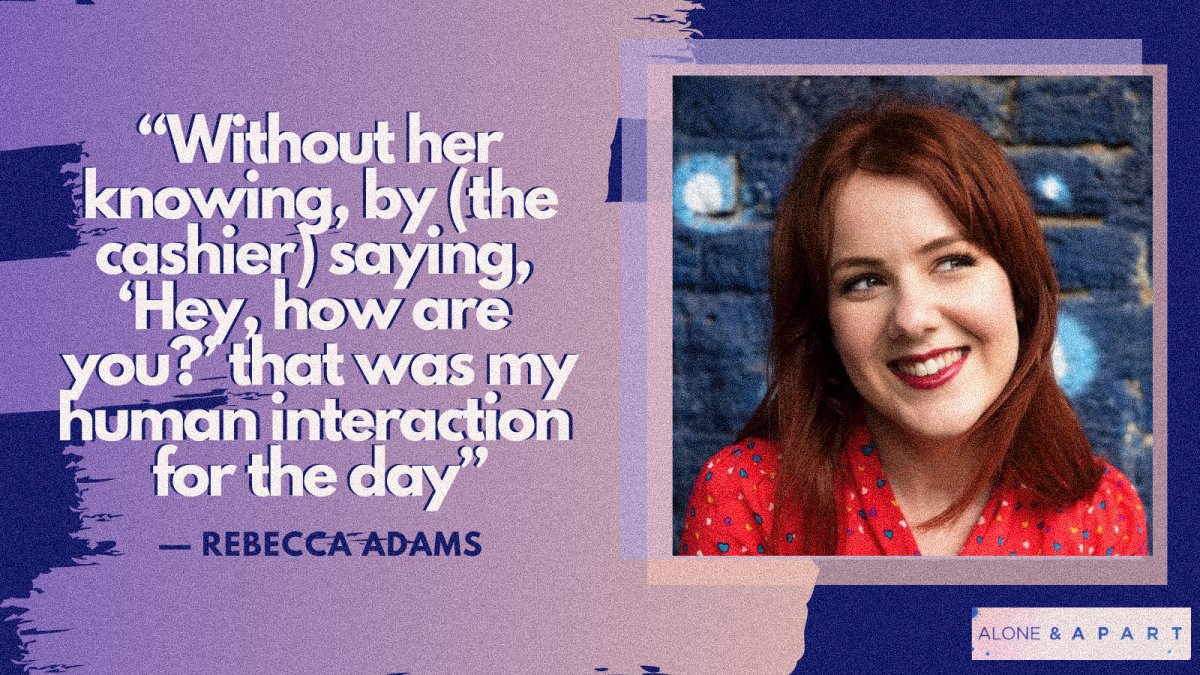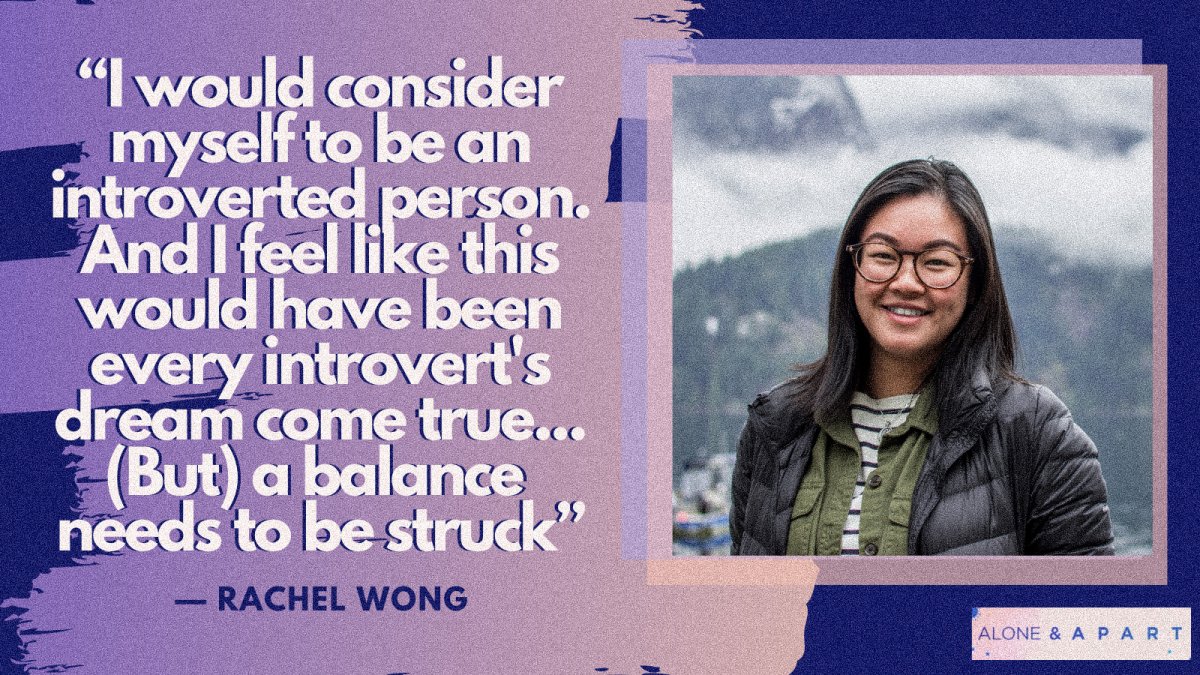Warning: This article may be triggering for some readers. Please read at your own discretion.

Rebecca Adams was living by herself in London, U.K., when the pandemic first hit.
“My mental health was impacted almost immediately,” she says. “I would cry … I felt just so alone.”
The broadcaster, originally from Australia, had started a new job at the beginning of the pandemic. After 10 months, she quit and found herself mostly lying around in bed.
“Even when you know you have so many people there for you, when you are in a bad place, you feel like you have no one,” she says.
She was diagnosed with anxiety and depression and made time to go outside at least once a day for her mental health.
Sometimes, talking to the cashier was her only human interaction for the day.
Countless studies and experts have highlighted how the COVID-19 pandemic has affected people’s mental health, whether they’re youth or adults. Loneliness in particular has changed how we socialize throughout the day and some experts say people may continue to struggle post-pandemic.
The types of loneliness in a pandemic
According to the Canadian Mental Health Association (CMHA), long before the pandemic, loneliness was considered a growing public health problem, even labelled an epidemic.
Rebecca Shields, the CEO of the organization’s York Region and South Simcoe chapter in Toronto, says episodic loneliness is something everyone experiences, whether it be going through a drastic move or trying to make new friends.
But when it comes to chronic loneliness, Shields says it is cumulative and can have a dramatic effect on people. She adds some research has revealed chronic loneliness has the same physical impacts on one’s body as smoking 15 cigarettes a day.
“There’s no one way that people experience it, but you can see that their immune system is depleted, their physical health… the stress can cause sleeplessness,” she says.
Shields says chronic loneliness can also impact eating patterns, metabolism and increase mental health risk factors.
“Chronic loneliness is a public health issue,” says Shields.
“Social isolation is preventing us or the frequency of being able to have connection with people.”
Populations that were already at more risk of experiencing loneliness include people living alone and seniors who may not have the same social connection as a couple with kids do, she says.
“The people who are most vulnerable already experience is exacerbated by things like the pandemic … If you’re already at risk, then even more at risk,” she says.
For students and youth, being around friends is important for overall social development, growth and belonging, Shields says.
“Having to stay home, not being able to engage with their friends, has caused a worsening of their anxiety and reported experiences of depression and struggle.”
Dr. Shimi Kang, a psychiatrist from Vancouver and author of The Tech Solution, says people often don’t recognize loneliness as a major medical issue.
“Loneliness is linked to the release of cortisol, which actually disrupts our immune system and weakens our immune system (and) leads to muscle wasting,” she says.

Get breaking National news
Kang always tells people social isolation is a form of human torture.
“(It) predictably leads to anxiety, depression and eventually even psychosis and suicidal thoughts,” she says.
There is a mental health curve that needs to be flattened, she adds.
“It is a parallel pandemic, in my opinion, and there are things we can do.”
“Thankfully, the human brain is resilient. If we do those things you’ve all heard a million times: self-care routine; regular sleep, exercise; outdoor time in nature… all of those things are natural antidepressants, they’re brain boosters and they can help us through this pandemic and beyond.”
But for some, reaching out for help is also needed. At the CMHA, Shields says the organization offers free, over-the-phone support for people with mild to moderate depression, anxiety, stress and worry. Additionally, family doctors can also connect people with the right support.
“If you think you need support, you probably needed it two to three weeks ago. If you broke your arm, you’d reach out if you had pain. This is the same thing,” says Shields, adding that working with your health team is a part of ensuring you feel better.
“All of us have to get through this and none of us can do it alone. We are social beings, we need connection, we need to support each other.”
Approaching mental health in a post-pandemic future

While the future of the pandemic remains uncertain, many have wondered how the pandemic is going to impact the overall need for mental health services and care.
How people manage during stressful times can impact their mental health, Shields says, adding that anxiety, depression and economic loss are all huge contributors.
“People who already had a mental health issue… are actually more impacted by the pandemic because they have less resources and ways of seeking care. And so I worry a lot more about the people who are already struggling,” she says.
Most people with mild to moderate depression or anxiety with good treatment and care can recover within a year, Shield says.
“People with pre-existing mental health conditions, vulnerable populations, young people, students, elderly. This has been so stressful for the last year and we have to be very concerned about their mental health,” says Kang.
Additionally, Kang adds that people on the higher end of the mental health curve have an opportunity to try and help others, even with as something as little as asking a neighbour if they need a hand, all to contribute to the recognition that we are in a “collective stress.”
“When we have that mindset we can come out of this pandemic, I think even better than ever.”
The normalcy of things being taken away
Going from not having to think twice about making plans to multiple new COVID-19 protocols and lockdowns has highly influenced Rachel Wong’s mental health.
Wong, a recent graduate of Simon Fraser University in Vancouver, says while she lives with her family, the loneliness and barriers between her and the outside world have affected her sense of well-being.
“There’s a part of me that feels like I always need to feel happy or talk to my parents or sisters,” she says, adding that the pandemic has created a space where she feels she can’t take time for herself.
Wong didn’t realize how much time she’d spent outside her home until the pandemic hit.
“I would consider myself to be an introverted person. And I feel like this would have been every introvert’s dream come true,” she says. “(But) a balance needs to be struck.”
The normalcy of things like her university graduation were markers of her identity that she feels got stripped away.
Now, Wong says she has questioned where her life is going and if the pandemic is ever going to end.
“We deserve to be listened to and to get better… We don’t have to bear a lot of these kinds of feelings of loneliness or isolation alone.”
Finding ways to cope

Kang says something people often don’t realize is how stressful multitasking can be.
“The brain doesn’t know how to do two things at once. Our brain needs mindfulness, one thing at a time, so small interruptions with our attention,” she says.
Kang adds that whether we’re checking our phone, listening to music, watching the news or checking email notifications, it can add stress.
“Even just a small habit of trying to avoid multitasking and doing things one at a time can be very helpful right now,” she says.
Additionally, Kang adds that avoiding things like sitting for prolonged periods of time and monitoring mindless scrolling are important to find a healthy tech balance as there is also a correlation between loneliness and technology.
“We need to see each other, we need to look at each other, we need to hear each other’s voices,” she says, adding that these micro-moments of connection release oxytocin, which is a neural hormone and powerful antidepressant.
While Kang says there are benefits to tech devices, like being able to video call loved ones, there needs to be a balance.
Adams says that for those that are struggling with mental health, there are people they can turn to.
“I don’t want people to go through what I’ve gone through, like, I’ve had some dark thoughts in my head,” she said.
“They’re not always alone… There are people you can call, whether it’s a counsellor on the phone or a doctor or a family friend.”
People who are in a cycle of loneliness often find difficulty getting out of the clutter of their own thoughts, like, “Nobody wants to connect with me anyways,” Shields says.
“That’s when we have to recognize that somebody that we love or care about or knows is experiencing loneliness and reach out or encourage them to connect and help them through that,” she says.
“Sometimes it’s something that we can do for them and sometimes they’re going to need some professional support.”
According to the CMHA, ways to cope with loneliness include avoiding comparing yourself to others; giving yourself time, especially when dealing with big life changes or transitions; finding ways to take advantage of time alone, like pursuing a new hobby; and working on your own social connections.
While studying chronic loneliness, Shields decided to explore the question of what could help someone who was feeling lonely and stuck in that continuous cycle.
She says she found the simple act of helping somebody else can help an individual feel better and connected.
Shields adds that while helping others may be difficult during the pandemic, there are still lots of ways people can help others, like reaching out to people via Zoom or a phone call.
Or it can be something even simpler like shovelling a neighbour’s driveway.
“That connection of being able to give and receive is so important.”
Alone and Apart is an ongoing Global News series tackling issues of loneliness and self-isolation, and creating long-lasting solutions to fight this epidemic within a pandemic. The series will run throughout the month of February. For more visit Alone and Apart.
————————————————————————————————————
If you or someone you know is in crisis and needs help, resources are available. In case of an emergency, please call 911 for immediate help.
Crisis Services Canada’s toll-free helpline provides 24-7 support at 1-833-456-4566.
Kids Help Phone operates a toll-free helpline at 1-800-668-6868 with 24-7 support for young people as well as the Crisis Text Line, which can be reached by texting HOME to 686868.
The toll-free Hope for Wellness helpline provides 24-7 support for Indigenous Peoples at 1-855-242-3310. Online chat services are also available.
Trans Lifeline operates a toll-free peer support hotline for trans and questioning people at 1-877-330-6366.
For a directory of support services in your area, visit the Canadian Association for Suicide Prevention.














Comments